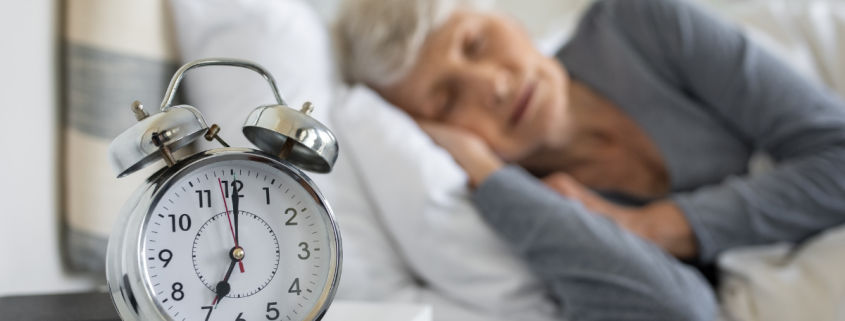Senior sleeping – the most common causes of sudden excessive sleepiness in the elderly and relations between sleep and age
Why do old people sleep so much? Why do the elderly sometimes fall asleep while sitting? And what are the reasons for sudden excessive sleepiness in the elderly?
Today we are discussing the relationship between sleep and age. Learn about the causes of sudden excessive sleepiness in the elderly, the reasons for the elderly falling asleep while sitting and why old people sleep so much to better understand your ageing loved ones and family.
How does growing old affect our sleep?
Most people sleep between seven and nine hours each night. Elderly people rarely sleep through the night, and about 4 in 10 older people take at least one nap during the day. This lasts at least half an hour. Most people over 80 take more than one nap each day.
Sometimes it takes older people more than half an hour to fall asleep at night. This affects about 1 in 3 women and 1 in 6 men. The elderly are most likely to wake up during the night and spend less time in deep, refreshing sleep. Seniors have less strength but also use less of it, which is why it is common for them to suffer from insomnia in addition to excessive sleep.
The most common causes of sudden excessive sleepiness in elderly
At night, our body produces a hormone that helps with sleep, called melatonin. Older people produce less of it and therefore find it harder to fall asleep. Other factors make it difficult to sleep and can cause waking up during the night. These include hot flashes in women after having to go to the toilet at night and other health problems, such as arthritis, which make it difficult to stay in one position throughout the night. After retiring, many people find that it is convenient to sleep a short nap during the day.
Diseases that cause sleep deprivation or sudden excessive sleepiness in the elderly
Many illnesses can make it difficult to sleep. Some of those that are common in older people are the following:
- arthritis,
- osteoporosis,
- Parkinson’s disease,
- incontinence,
- indigestion,
- heart disease,
- lung diseases such as asthma.
Medications used to treat these conditions can also interfere with sleep. Some sleep disorders are more commonly seen in older people, including sleep apnoea and periodic limb movement disorders.
Anxiety and depression can interfere with sleep and cause insomnia at night. Dementia or Alzheimer’s disease can impair sleep quality. People with these conditions are more confused at night and may walk aimlessly around the house. This is detrimental to the person with the condition as well as the carer. This problem is worse if the older person does not have enough exercise or interesting activities during the day.
The problem of elderly people falling asleep while sitting
Elderly people fatigue easily and could potentially end up falling into a deep sleep during sitting. It is not a big problem if this happens at home or in other safe environments. When the person is not alone, their carer or child can easily escort them to bed or wait it out. However, the issue could become much more serious if the older person falls asleep in a public place or a means of transportation. In such situations, they not only lack someone to help them, but they can also seriously injure themselves or others.
Why do the elderly fall asleep while sitting?
There are many reasons for sudden excessive sleepiness in older people. Let’s discuss some of the most widespread.
Insomnia
Many older people suffer from insomnia – it regularly takes them more than thirty minutes to fall asleep. Furthermore, research has shown that some older people wake up multiple times during the night and find it difficult to fall asleep and need to assist with sleeping aids to fall asleep more easily. It is insomnia at night that can lead to falling asleep during the day.
Health conditions
As elderly people age, their bones, muscles and even their immunity gradually deteriorate, which can result in various chronic ailments and even autoimmune diseases. For example, some elderly people control their blood glucose levels around a threshold or suffer from high blood sugar levels. Such sufferers frequently wake up during the night to urinate or even to drink water, which can disrupt their sleep cycle and lead to sudden falling asleep during the day.
Cardiovascular diseases
According to research, sleeping during the day is one of the red flags for serious cardiovascular disease. A 2018 study found that seniors who nap during the day are four times more likely to get a stroke than those who have a regular sleep schedule.
Senior sleeping problems – conclusion
Healthy sleep is the foundation of the body’s strength and vitality, so symptoms such as too little and too much sleep are not worth ignoring. In such situations, it is best to consult a doctor quickly to reveal the cause of sleep problems.















